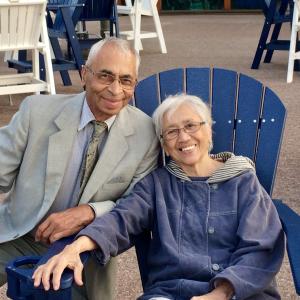A couple’s commitment to patient care—and each other—recognized in endowed professorship
As they pushed their Vespa scooter up a rain-soaked Indian hillside in 1969, Shyam and Kalindi Pathak found themselves at the midway point of two entirely different journeys: the one that led them to this 8,000-mile adventure through the Himalayas and another that awaited them in the United States.
By then, the Pathaks had already achieved legendary status with the locals in Gondia, a railway junction town in central India. Working side by side, the couple tended to more than 100 patients a day at a hospital they founded and managed.
Establishing a hospital was never part of the Pathaks’ plan, but when Shyam was unable to secure surgical residency as a foreign-trained doctor, he looked for another way to serve his community.
An anesthesiologist, Kalindi Pathak would team up with her surgeon husband to perform five to six surgeries a day. But it was her pre- and postnatal care that earned her a reputation with expectant parents—with some traveling as far as 400 miles for her assistance and advice.
“One day, a mother brought her baby, who was very dehydrated, to the hospital,” Shyam Pathak recalled. “She was afraid her child wouldn’t survive. But, when the baby recovered, word spread quickly and a bus arrived at the hospital the next day—filled with patients who had heard the story.”
Relying on the support of wealthier patients to offset the costs of those with limited means, Shyam and Kalindi built an essential lifeline for their community when facilities were few and financial resources thin. However, their philanthropic approach to healthcare delivery came at a cost.
Working outside the traditional healthcare system,, the couple faced resistance from a variety of political and bureaucratic entities in their region, Shyam Pathak said, leading them to make a difficult decision to leave their home for the United States. Spending three months on the back of the scooter as they awaited word of their visa approvals, the couple explored their homeland before departing for Cleveland, where they learned from friends that a number of residencies were available.
On arrival, Shyam Pathak interned at Lakewood Hospital and later served as an orthopedic resident at Mt. Sinai Hospital, where Kalindi was an anesthesiologist. The two also served at Deaconess Hospital, and Shyam eventually became chief of medical staff at Parma Community General Hospital before retiring in 1996.
While a researcher at Case Western Reserve University School of Medicine during the 1980s until retirement in 1991, Kalindi Pathak specialized in delivering orthopedic and pediatric care, particularly aiding in the recovery of younger patients overcoming challenges from scoliosis. As she did in India with expecting parents, she emphasized a caring, patient-first approach.
Before Kalindi passed away in 2018, the couple explored opportunities to give back to CWRU in a sustained and meaningful way—with education at the core. Through their support, the School of Medicine established a professorship, and last year, Matthew Norcia (MED ‘91), MD, was named the inaugural Shyam Pathak, MD, and Kalindi Pathak, MD, Professor in Anesthesiology.
Norcia joined the faculty of CWRU in 1996 and serves as the executive medical director of the Master of Science in Anesthesiology program. In that time, the program has revamped its curriculum, expanded to Texas and Washington D.C., and this year, graduated close to 100 students—filling an increasing need for anesthesiologist assistants.
“I am very thankful to have been selected for this professorship,” Norcia said. “When I had the opportunity to meet Dr. Pathak, in addition to offering his support, he told me, ‘From now on, you and I are friends.’ It’s their kindness and generosity that made this professorship possible.”
Shyam Pathak sees the creation of the professorship as a fulfillment of a promise he and Kalindi made to each other: to remain with and honor the late partner’s soul. “This gift is a perpetual, progressive act to promote integrity and fairness,” he said. “Education takes away the boundaries between people. The best gift you can give is that experience.”
Originally published in the summer 2024 issue of Forward Thinking magazine


